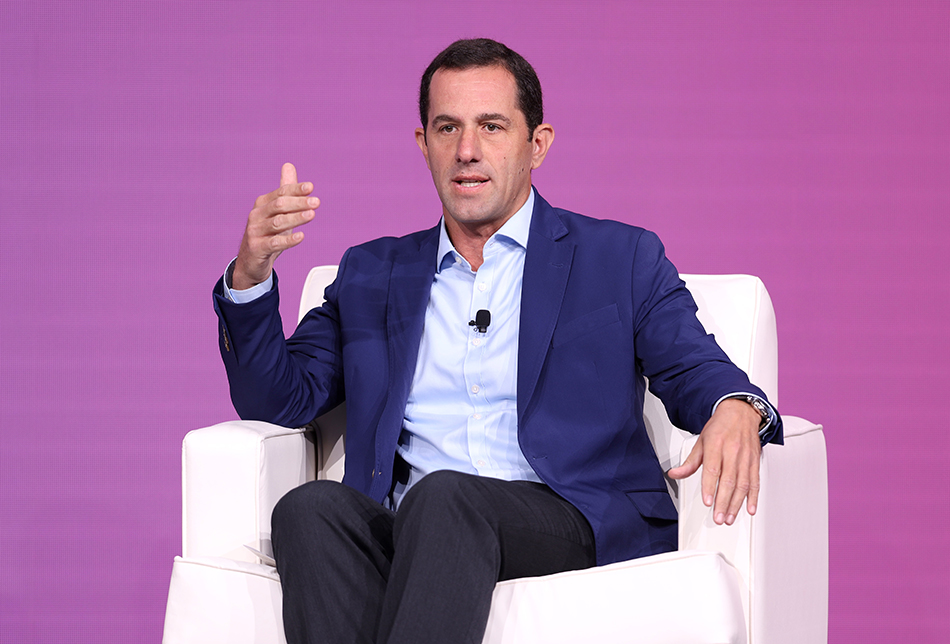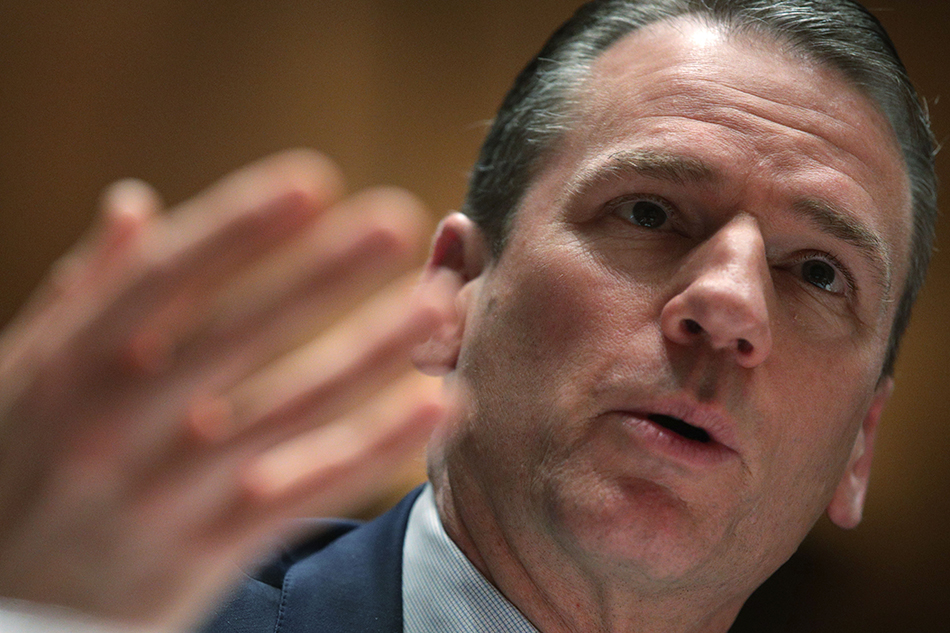IAB: National Privacy Legislation Is Job One
Trade group public-affairs VP Dave Grimaldi pushes for U.S.-wide framework

The smarter way to stay on top of the multichannel video marketplace. Sign up below.
You are now subscribed
Your newsletter sign-up was successful
Dave Grimaldi, former chief of staff to Federal Communications Commission member Mignon Clyburn and senior counsel to her father, House Majority Whip James Clyburn (D-S.C.), heads up advocacy before Congress and federal agencies for the Interactive Advertising Bureau, which represents some of the largest publishers and platforms in the world.
Grimaldi, executive VP of public affairs for IAB, talked with Multichannel News about the potential new challenges to online advertising from Washington and state and local governments as President Donald Trump targets social media for regulation, states look for new ways to compensate for the economic sledgehammer of a global pandemic, and the nation — including IAB’s roster — looks to protect consumer privacy. Here’s an edited transcript of that conversation.
MCN: Remind us who your members are?
Dave Grimaldi: Mostly publishers but also platforms, including The Washington Post, The New York Times, Google, NBC and Disney.
MCN: Why are IAB and the other major ad associations concerned about a California product-liability law currently in the legislature that makes advertisers liable if a product is deemed defective?
DG: When you talk about strict liability for advertising, you could have a gardening blog running ads on your site and if one is an ad for a can of Coke or Sprite and the can explodes, all of a sudden this gardening blog could be liable for putting that can of Coke into commerce. [The liability bill applies to businesses “facilitating the placement of products into the stream of commerce.”]
This impacts small to midsized businesses monetizing their content. It is another example of a law that neither consumers nor American businesses know is coming.
The smarter way to stay on top of the multichannel video marketplace. Sign up below.
We appreciate consumer protections, but this goes too far. This liability piece is absolutely unprecedented. The economy is already getting walloped by COVID-19.
MCN: So what can be done about it?
DG: This is my main theme and I will say it 100 times: We need a national federal [privacy] framework to put these things through regular order and due process and the debate that is necessary.
MCN: What are some other threats out there?
DG: We are seeing other out-of-nowhere emerging threats in the form of state and local advertising taxes that are put in city budgets. COVID has decimated city and state revenues. We are going to see it over and over again because it is a low-hanging piece of fruit.
MCN: What is the status of the California Consumer Privacy Act or CCPA?
DG: The final regs were just approved a few weeks ago and enforcement just began. But this November there is going to be a substantially new ballot initiative, the CPRA [the California Privacy Rights Act], that will amend the language of CCPA and require additional rulemakings.
The CPRA ballot initiative was introduced by Alastair MacTaggart [board chair of Californians for Consumer Privacy], the same real-estate developer who came up with the CCPA. I give him credit for his tenacity and his creativity and doggedness and identifying that California’s ballot initiative rules opened the door to CCPA. And now the CPRA is going to add a new layer to CCPA and the burden will fall on consumers to understand.

MCN: Is that why IAB says there needs to be a national privacy regime?
DG: We need a law that lays down clear rules of the road, that lays out prohibited and allowed data practices, and that is the draft bill that we gave to Congress. The notice and consent regime is broken. No one understands it. It is not easy on consumers to navigate.
MCN: But as a practical matter, nothing is going to happen on privacy legislation in the near term with an election coming up, correct?
DG: What happens on Nov. 3, especially in the Senate [which is currently in Republican hands], is going to mean a great deal for online advertising and for consumer privacy writ large. You have extremely knowledgeable Democrats who are eager for a gavel to do antitrust oversight and anything to do with data brokers regarding privacy, the use of personal information and the guardrails around all of the above.
That is not to say that the Republicans aren’t doing this, but you have progessive Democrats who are very fired up. So, if the Senate goes Democratic, I think that online data privacy will be a top-three issue for the Senate Commerce Committee.
If Joe Biden wins the White House, then you have Democrats in the White House and controlling the Senate and House, and you could see significant overhauls. And that is what we want.
MCN: So significant privacy legislation is good for IAB?
DG: Yes, a national privacy law that pre-empts a patchwork of state bills that consumers are going to have to navigate. When they get on the plane at LaGuardia [Airport] and they get off the plane at LAX, they are not going to have to face new user-experience windows, they are not going to have to face privacy controls that have to be changed state by state. So, yes.
I don’t know how urgently or how fast national privacy reform will come, but it will come.
I think there is an open question on whether if Joe Biden wins he installs a privacy czar in the White House. Does he create a CFPB [Consumer Financial Protection Bureau]-like agency to tackle consumer data? What happens with antitrust? What happens with the use of market power? All of these are good questions. We have 600 members and it affects all of them.
MCN: What is IAB’s take on the president’s attempts to regulate online content and modify Section 230 of the Communications Decency Act?
DG: Section 230 has played a role in the Internet that everyone knows and loves and it has given rise to platforms that every American is using every day. The discussion around additional improvements that can be made is a good one. But it should be a deliberative process and not an executive order.
Section 230 was passed by Congress. It should be amended and debated at the committee level, with witnesses and testimony, and in both Houses of Congress on the floor, with buy-in from industries. It has gotten mired in politics and a sexy election year debate and the events surrounding it aren’t without real harm and real drama based on speech, and there are opinions on both sides around how a free online town hall works. Should there be policing of it? Who should be the arbiters of what is dangerous or not? All of these platforms that are protected by Section 230 are taking this extremely seriously and wrestling with their decisions.
But if change comes, it should come through Congress and the deliberative process, not executive order. I’m a Democrat and I would say that in a Democratic administration also.
MCN: What other big issues are on the horizon?
DG: If 2020 was the year of privacy, 2021 is not only the year of privacy but of the online economy generally. There was a love affair for eight years between the Obama Administration and Silicon Valley, and it all changed in 2016 with Russian interference and Cambridge Analytica and everything else. A dark cloud moved in over the use of online data and that cloud has been parked there ever since. It has gotten conflated with Section 230 and with apps knowing where you are night and day. It has turned into rampant demagoguery around an industry that is a massive piece of the national economy.
If you know what this is, great. If you don’t, you are going to hate me because you are never not going to see it. But there is a little blue triangle in the corner of every single ad that is served on the internet; you click it and it lets you know why you were shown that ad and it shows you how to turn it off. We created that because people wanted transparency.
We are not against greater scrutiny. We expected that and we welcome that. We are calling for regulation and it’s not often that an industry does that. There is a referendum on the use of online advertising and we have been proactive. But the focus on consent is misplaced and it does not address the underlying concerns from lawmakers and consumers.
There are things like stalking and the use of geolocation and 911 data that have real-world ramifications, but those are apart from how personal ads have an impact on your life.
If you are a soccer player and there are ads for new cleats or balls when you are reading an article, people prefer those to generic ads. The issues around how data is used is a debate that we want.
Contributing editor John Eggerton has been an editor and/or writer on media regulation, legislation and policy for over four decades, including covering the FCC, FTC, Congress, the major media trade associations, and the federal courts. In addition to Multichannel News and Broadcasting + Cable, his work has appeared in Radio World, TV Technology, TV Fax, This Week in Consumer Electronics, Variety and the Encyclopedia Britannica.

